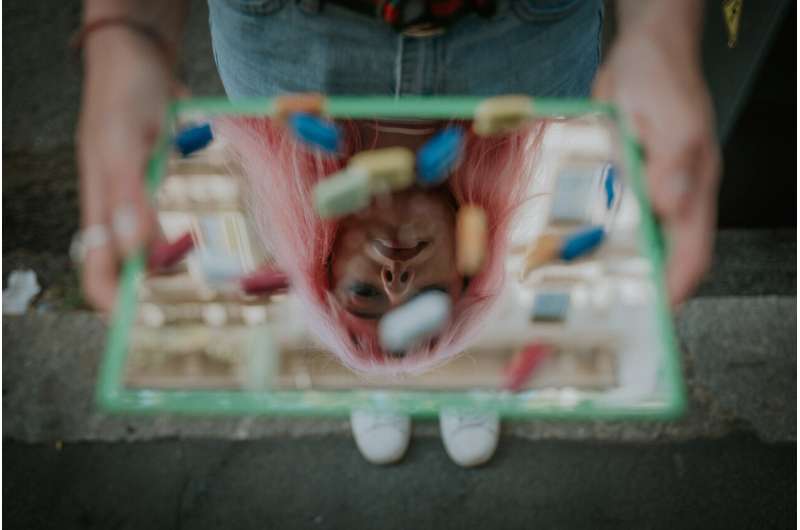
Credit: Unsplash/CC0 Public Domain
Tests of illegal drugs bought online found that 35 per cent were not as described, highlighting Australia's urgent need for more local drug testing facilities to prevent harm and overdoses.
The RMIT-led study, in collaboration with the Australian National University, the University of New South Wales, Sydney and Canadian testing facility Get Your Drugs Tested, analysed 103 illicit drug samples obtained from the now-defunct dark web forum Test4Pay.
The study found that 65% of the samples contained only the advertised substance, while 14% of the samples mixed the advertised substance with other psychoactive or potentially harmful chemicals.
Meanwhile, 21% of samples contained none of the advertised substances.
MDMA, methamphetamine and heroin were consistently found to contain only the substances advertised.
Products marketed as ketamine, 2C-B and alprazolam are likely to be completely replaced by other substances and new synthetic drugs, increasing the risk of unwanted side effects, overdose and death.
Of the 19 cocaine samples tested, only four contained pure cocaine, 13 contained other substances, and two samples contained no cocaine at all.
Lead researcher Dr Monica Barratt, RMIT Vice-Chancellor's Senior Research Fellow, said the results were concerning as drugs sold through cryptomarkets – online sellers on the dark web – are thought to be less likely to be mixed or substituted with other substances.
“Because crypto markets allow anonymous buyers to review their purchases, in theory merchants selling poor quality products are more likely to receive bad reviews, thereby benefiting merchants selling superior products,” said Barratt, from RMIT's Centre for Social Equity Research.
“However, despite these perceptions of accountability and quality, our findings indicate that prohibited drugs purchased in cryptocurrency markets remain at risk of adulteration and substitution.”
Dark web drug markets
The 2023 National Ecstasy and Related Drugs Reporting System survey found there was a slight decrease in the number of people buying drugs on the dark web, with more people using messaging and social media apps to obtain drugs.
“These apps are much more convenient and easier to use than the dark web, but they lack many of the security and review features of darknet markets,” she said.
Barratt said Australia's policy on tackling darknet markets was focused on using law enforcement to “disrupt” activity.
“These crackdowns are being carried out to create a general sense of deterrence by announcing arrests and market disruptions,” she said.
“However, through our research into darknet market takedown activity, we know that the ecosystem adapts quickly to market removals.”
“These days, vendors have accounts in many marketplaces, so if one marketplace goes down, clients can find it in the others. This reduces the disruption caused by removals.”
Australia's approach to drug control
Mr Barratt said it was more urgent than ever to launch more drug testing services as Australians found new ways to obtain illegal drugs.
Currently, CanTEST is the only drug testing service available in Australia, but Queensland is due to launch its own service later this year, with Victoria considering following suit.
“Drug testing is a preventative and practical response to the health risks posed by unpredictable drug markets, often detecting harmful substances before they flood local markets,” she said.
Drug testing services have been operating around the world for more than 50 years, but Australia has still resisted expanding harm reduction services, Mr Barratt said.
“Australia is resisting the expansion of drug testing facilities because it believes that drug testing 'permits' drug use,” Mr Barratt said.
“Drug testing services will never tell consumers that a drug is 'safe' because no drug is 100% safe for use.”
“What this service can do is explain the known risks of certain drugs in a trustworthy, non-judgmental way, enabling people who use drugs to adjust their behaviour to reduce their risks.”
A systematic review of pill testing conducted in 2022 found that people who found unexpected substances in their medication were more likely to discard the drug and adjust how they used it.
“If we can prevent overdoses in the first place, we not only reduce harm for consumers and avoid distress for families, we also reduce the strain on our emergency medical systems,” Barratt said.
“Counterfeiting and Substitution of Medicines Purchased in the Australian Cryptocurrency Market: A Test4Pay Analysis” Drug and Alcohol Reviews.
For more information:
Monica Barratt et al. “Counterfeiting and Substitution of Medicines Purchased in the Australian Cryptocurrency Market: An Analysis of Test4Pay” Drug and Alcohol Reviews (2024). DOI: 10.1111/dar.13825
Provided by RMIT University
Quote: More than one-third of illicit drugs sold on the dark web found to contain unexpected substances (March 5, 2024) Retrieved June 11, 2024 from https://medicalxpress.com/news/2024-03-illicit-drugs-sold-dark-web.html
This document is subject to copyright. It may not be reproduced without written permission, except for fair dealing for the purposes of personal study or research. The content is provided for informational purposes only.

